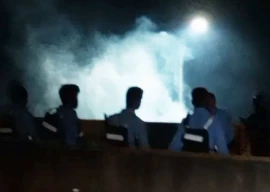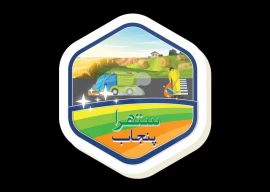But Jinnah, despite the portraits where his suits are painted over as sherwanis, is an image, we, the liberals of this country, can relate to with much ease, so much so we now have some signs of ‘wear a Jinnah cap day’. Distance to ritualised religion; foreignness to tradition, including his propensity to the new, perhaps makes an ideal template for the liberal Pakistani. But, more importantly, the image provides a suitable background against which our persistent colonial hangover continues to make some sense.
In a rather revisionist spirit, Ayesha Jalal has attempted to resurrect a Jinnah few in the Republic would endorse. Amidst a well-put-together audience of liberals at the Mohatta Palace last year, Jalal offered a fascinating thesis. Jinnah, in her opinion, did not originally envision Pakistan as a separate country, instead he imagined national sovereignty and self-governance for the Muslims of the subcontinent under the all-embracing Indian umbrella. Correct or otherwise, Jinnah, if given another chance, would perhaps willingly have aligned himself with the sophisticated position of Jalal. I am not concerned here with the particular form his vision took, neither do I stand to pass a judgment on history, though his own humanist position was hardly shared, let alone understood by the masses he commanded. My discontent then is not with Jinnah or with Pakistan, as it may seem. In fact it stems from the intellectual poverty of its liberals, who seek to resurrect inconsistent parts of an ideology that has long sunk into the Bay of Bengal. In response to the growing intolerance in our society, we often quote Jinnah from his admirable address of August 11, 1947: “you are free to go to your temples, you are free to go to your mosques or to any other place of worship in this State of Pakistan. You may belong to any religion or caste or creed, that has nothing to do with the business of the State.” What is worth questioning, however, is how to wish away religious difference in a territory that is founded on the very discourse of cultural and religious difference, the Two-Nation Theory to be precise.
Wary of what seemed to unfold in August 1947, in a poem titled Subohe Azadi (The Dawn of Freedom), Faiz famously wrote “yeh woh sahar toe nahi” (lit: this is not that dawn). Quratulain Hyder, on the other hand, weaves a millennia of a narrative to question the cultural uprooting of Indian Muslims in her epic Aag ka Darya (The River of Fire). First published from Lahore in 1959, the novel challenged the exclusionary stance furthered by the All India Muslim League. Yet, in the new country, there was a desire to make something anew. But little space was left when it turned to those who sought to further purify this land of the pure.
In our impoverished attempts to reclaim this space, we continue to unearth the remains of a twentieth century ideology; we are eager to present history as a meaning-making whole, in narratives that espouse the grand and the romantic at the expense of the fragmentary and the marginal. Inheriting distaste for diversity and difference, and in our fear of local and ethnic grammars, we have enforced vocabularies of assimilation. If at all, we have inherited a notion of identity which is constructed on the very premise of its distinction in its opposition to an imagined Other. The Other-ing as we are witnessing has since not ceased.
To persist on the discourse that Pakistan was meant to be a secular state is to feign a belief that we have some recourse to an original moment whereby the dream can be salvaged. This is but a false pretence for hollow ideologues. More so, it is an ahistorical reading and a glossing over of various ideological forces that since its inception have fought for recognition in the State of Pakistan.
To hold on is to linger; to persist is to resist change. If there is a befitting answer to the ideology of those we fear losing our freedoms to, it is in the intellectual pursuit of an emancipatory vision, shared by all and owned by us, which is no longer tethered to the original bias of our foundation. For in Jinnah’s Pakistan, some are not even allowed to call their mosques, mosques and some not even free to go to their mosques, let alone their temples.
Published in The Express Tribune, August 16th, 2011.
COMMENTS (51)
Comments are moderated and generally will be posted if they are on-topic and not abusive.
For more information, please see our Comments FAQ


1729080111-0/BeFunky-collage-(63)1729080111-0-165x106.webp)
1730838202-0/Trump-(1)1730838202-0-165x106.webp)













@Jamel: I assume you completely understand Maududi's philosophy. Can you clarify how we're living in Maududi's Pakistan,
@ Arjun I will say hahahahahah what u saying india never have problems with sri lanka or burma where last mughal king is buried may be thats a reason you goes there but when ever i saw indian chennels on T.V they shows only anti pakistan news with funny hindi urdu mix language and why after testing a wmd in 1998 mr vajpai said now pakistan will be our colony if u remember that and about mumbai attack there are lot anti indian peoples and so many states dont want to live with india for example kashmir and assam and tripura and most recently indian punjab also want to seprate from india matha and how indian forces terrorize them and even democratic govt distroy a there holy place in amrithser one more thing i am also intrested in reading india because what is going on in karachi and baulochistan there is india inviolved with afghan traiters whom we give place to live after 1979 soviet attack. let me tell you indian are not ANGELs either.
Tanoli, to be honest, the only reason I started following Pak media is because I'm a Mumbaikar and I wanted to understand the reasons behind the constant attacks on our city. Before that, Pakistan was as obscure a neighboring country in my mind as say Burma. And that's the case for the majority of Indians, except for those who had connections to the land before like the punjabis Sindhis and Pathans. Our only interest is for your country to stop attacking us and maybe in future build trade, transport and tourism links through your country to Iran and central Asia and beyond. Like we are on our eastern front. So I didn't understand your point about the donkeys but it seemed inaccurate.
@ Arjun Let me tell you something its been over half a century since india partition but peoples on both sides really still wanna know each other litsin to each other some times been very arguments but one thing is for sure we cant live with out each other i dont know but this is a truth man its like a we have love of donkey means bites each other hahahahahhahh
Tanoli, Indians have zero interest in making pak a Suba e Hind. Thanks but nothanks - we have enough nuts in ourcountry as it is.
i am so sorry to tell Quaid that in his Pakistan people are not free to go to the mosques so mentioning temples ,and other worship places is worthless. we as a nation have made a mess of ourselves,for this i as a Pakistani is very much ashamed. Quaid 's ideology has been borrowed by so many countries even by our nieghbours and we stupid nation is following the so called countries who only give right to the people of thier favourite firqas to live.
Once upon a time there was a small country of small villages living happily. A group o pirates came to one of the villages and threatened them. Pirates offered the villagers to join them or be ready for violence, rape and torture.
Villagers had no choice but to agree. It became the village of pirates. They looted and plundered all the villages around them and lived happily until there was no one left to loot from.
Now the original pirates started targeting the villagers turned pirates.
Villagers didn't like that and demanded no more piracy and no more looting. They demanded back the peaceful lives they lived before the pirates arrived.
Pirates burst into laughing hearing that and continued their assault. The other villages that escaped the wrath of pirates did not trust these villager turned pirates and left them alone.
The real pirates are now targeting the fake pirates one by one.
And the rest of the villagers are watching closely.
That is where the story is - don't go anywhere - keep watching the climax is approaching...
@Hatim: To those bigot mullahs who have imposed themselves on us with their salafist doctrine. Allama Iqbal had these wise words for them and all others who are bigots. '' Khuda tujeh kissi toofan seh ash e nah kar deh Keh ter e be- har ki moh joh meh istrab nahi Tu kitab kho wan hai magar sahib e kitab nahi. Try to locate in the library Historic Documents of Muslim Freedom Movement with preface written by Jamiluddin Ahmed Published 1970 third edition. gain an insight to the subject of the creation of Pakistan.
it is in the intellectual pursuit of an emancipatory vision, shared by all and owned by us, which is no longer tethered to the original bias of our foundation.
With complicated words, I assume the author is indicating at the difficulty in building an 'emancipatory' vision on a foundation cast in the two nation theory. So, he chooses to simply do away with the biased foundation, and presto, problem solved.
Not so easy. How would you answer existential questions, what will guide you when you are in doubt? Can a western liberal structure be transplanted regardless of the cultural/social realities?
You need to think, and work harder. You need to create an argument for moving away from your foundations (and to wherever), and seal it with your co-citizens. That gets you convincing answers, when in doubt.
that looks like really hard work at the moment in your country.
The 2 nation theory made sense,to many folks.Constantly being unhappy and rioting,killing and other activity,if two different peoples have to part ways on the basis of religion,where one calls the other name,and feels one will be discriminated on the basis of religion,then it made sense.But the fly in the ointment was ,how it was done,one insisted they can not live in the same house,other said 'we can'.Two equal ideas can not be fact and true,howsoever we may tuck and sew,the walls.That's what has happened,the partition was done not right,too much haste,where people were intermingled for centuries were asked to seperate in months.What is worse,more people choose to stay than leave.This though validation of Azad and Gandhi,it did not deter Mr Jinnah,who got better of the deal,left ,a lot of his folks in India,which suited him good,as he closed the border of his new state to fellow muslims who either were prevented or opeted to stay,and today they are in no mans land,a constant problem to say mildly.For Pakistan,a problem of immense magnitude,which they are unable or unwilling,or both.I firmly believe,the partition was a right move(done wrong),no way,Muslims,hindu and Bengali muslims can either live with other in 2 parties.Can you imagin almost 2 billion people living in undivided India,it would be nightmare which would not end.Whatever shape they are now in ,it is like hot pan,but not in direct fire.How best we 3 nations deal with sitution?There are no easy answers,as we have crossed the point of no return,as our population and sheer number make solution next to impossible,however we may deny it,the train has already left the station,no use rehashing Mr Jinnah,or lamenting Azad or Mr Gandhi.They were actors and accident of time.
@Hatim:
Actually we are Maududi's Pakistan if truth be told.
And here comes more Jinnah related philosophy! I am sorry to say but you guys love to quote your Quaid-e-Azam only when it is convenient for you. What was his religion/sect by the way? I am afraid to speculate what would have happened to him if he was born in today's Pakistan. You all know that Pakistan has gone too far away from being Jinnah's vision. Making hollow statements about him won't achieve anything. Give it a rest!
@Aamir Hameed:
Oh the irony of justifying murders of Salman Taseer and Shehbaz Bhatti in the name of Islam and then calling Islam a religion of Salamti.
Try to understand your own confusion on this issue; Were Taseer or Shehbaz Bhatti convicted of any crime? No. So what were they murdered for? Plus only courts can punish a person in a country which is run by a religion of Salamti and not by savage ideology, in theory. However your definition of Salamti is grossly skewed.
Mr N was was brillant as he avoided the cut from moderator being to the point without ripping Mr Jinnah,two nation theory or any thing about real Islam as it is praticed all over the world by Muslims.I often wondered how best to write,making society determined not to change,alter or modify,yet show them the reflection on mirror.I have to paste HIS comment as basis for my own for future refrence.I always want myself personnaly to get better than what I was ,a day ago,without this intense urge to get better,we get no where.It is valid for society as well as nations.We have to understand,it is not what the sciptures say,they all say exhalted thoughts,it is what society live as its creed.Tollerance is not word,the practice of it,that matters.How did 25% become 5%???.Why prople are not even safe in their own home,leave alone mosque?I do not know,what's the answer,a good place to begin,is ack,there is some problem some where?Mr Malik,Mr N,Mr "MY name is Khan,Mr Hasan,these are very thoughtful people,in a "Daria' of hateful and intollerant waters.Still I am thankful to Mr N.
One group had opposed Jinnah's Pakistan ideology and this is the same group which are killing people in Mosque, temples, churches. I think every Pakistani is familiar with this group, but we are not dare to let down this fanatic group.
Jinnah's Pakistan or Iqbal's Pakistan? We might be Jinnah's state, but we are Iqbal's nation.
'....the intellectual pursuit of an emancipatory vision, shared by all and owned by us, which is no longer tethered to the original bias of our foundation...'.
Congratulations on hitting the nail on the head.
The only soultion for Pak is secularism!
I think the two hardliners,Liberals and Fundamentalists have ruined the Ideology of Pakistan.The fact is in between.The persons on so responsible Portfolios like Taseer and Bhati should not comment like a party.Our success is in a perfect Islamic social system,which is not property of Mullah,which has no Jealousy,no discrimination which is Salamti for the whole mankind rather than their clane,their culture,colour or language.Watching an Indian channel last night, I saw an ad for an upcoming movie. The tagline read 'Coming to you this Eid" - For a moment I wondered what was wrong with that line, then realized, I would NEVER see something like that on our Pakistani channels. Can you imagine a tagline reading 'Coming soon this Diwali?" Or Christmas?
We're in a pathetic state. Great blog post!
@N:
one word- brillant !!!
The dire situation is because of the politicians and our leaders and not Jinnah. The country was for the economic, financial and political betterment of the muslims of S Asia. Pk would have been much more of an undeveloped area even today had it been part of India
Dear, I would like to say that if every muslim is a fundmentalist then why every Amirican can't be a CIA agent
Can you please provide a reference for Jalal's thesis?
Jinnah, the Quaid, made us free to go to any place in the homeland but now we can not walk on any street, garden or a market place without losing any thing if not the life. People are very free to stop you or your vehicle on a road, in broad day light, will abuse you will beat you and take away all your money and any valuable possession. They will enter into your house, without any hesitation and search it very comfortably, while beating you and made to sit in a corner. Same is the liberty in Banks, offices, Buses and trains. Liberty is too much in my beloved country as spoken by my Quaid. But rulers, leaders and elite are safe and will remain safe; this is the point of solace for us as they are working hard, day and night, for our betterment including safety.
'' Your Mosques '' the words of Mohammad Ali Jinnah so profoundly misinterpreted by the Saviors of Islam. Today your mosque is based on your ethnic, sectarian, linguistic and not to forget political affiliation. Entering the wrong mosque could cost you and your family havoc. So I stopped going to the mosque in Pakistan since 1980.
"If Jinnah envisioned a nation where religion would not be a matter of the state, as many would argue, he clearly failed to spot the crevices in his own argument."
Just beautifully put. You cannot propagate 2 nation theory, a theory which essentially says that 2 set of people cannot, at any cost, live together and say Pakistan should be a secular Country. It just doesn't work that way.
Jinnah just couldn't see it, or must have ignored it. Sure as hell a lot of others saw through the contradictions of Jinnah and the most important of those was Abul Kalam Azad. He had predicted the present state for Pakistan when Jinnah started propagating the 2 nation theory.
History will show Azad was right, but Jinnah was wrong. Pakistan is Jinnah's greatest mistake, intentional or was for the lack of foresight we may never know.
@Moderate: "Non-Muslims are not allowed to take part in legislation process (since it will be based on rules of Islam) and thats it, I dont know from where you get that notion of second class citizens." . Do you not see the irony in that? Does the tautology, inherent in that calculus, not stare you in your face? Don't you realise, that is the reason, why Pakistan is in the mess it is today? I am glad, that I have heard saner and more human Pakistani voices, on these forums and others. Which is why, I am able to sanctimoniously, discount your self-smug pronunciations. Try meditation. It does take the edge away. Phew!
@Nadir El-Edroos
Referring to speeches of Jinnah during 1945-46. Google or dig up in history books.
@Waqeel Hindvi
You want to have a glimpse at real Islam, go study books regarding Islamic history during times of Prophet PBUH and four Caliphs. Non-Muslims are not allowed to take part in legislation process (since it will be based on rules of Islam) and thats it, I dont know from where you get that notion of second class citizens.
@Junaid:
"People so easily tend to forget that Islam is the most tolerant and the most liberal of the religions.. everyone is free to go to mosques, temples or synagogues in an Islamic state." --Is this an attempt at comedy???
You can theorize, wish, dream and believe in fairy-tales, but facts are facts, truths are truths, evidence is evidence. No reasonable person or mind would believe the comment you touted above. The only way you could make that argument is by saying there are no "true Muslims" in the "majority Muslim" nations at all -- that the "true Muslims" live in Scandinavian countries primarily!!
What you should have said is this, "I WISH Islam was the most tolerant and the most liberal of the religions and that everyone was free to go to mosques, temples or synagogues...but, unfortunately, it simply is not that in ANY part of the world it is practiced...it is by all accounts the most oppressive, the most discriminatory, the least tolerant and the least liberal religion that exists, unless one considers Communism a religion..."
It is confusing at time to understand who is true Muslim in Pakistan, going on wall chalking in certain areas, sizeable population of our country aren't even Muslims "yet". Ha! our Hindu brothers shouldn't moan about none Muslims' plight in Pakistan because according to our scary eyed protruding belly Mulla more than 80% of Pakistanis are none Muslims.
First of all, I would like to thank all contributors, from the subcontinent and outside it, who make the Express Tribune threads such a treasure house of intellectual debate and ferment. Much appreciate the fact that you consider it worthwhile to share your ideas with a wider group. I have learnt a great deal from these threads and hope that you will consider my comments in the light of a frank discussion / debate and not in the spirit of pointless contention, which is too often the hallmark of other less exalted threads elsewhere on the internet. . @Moderate: "if we were following real Islam, things would be have quite different).". Help us. We really want to understand. What exactly is 'real Islam'? Shariah? How do you reconcile that with a secular system? Just by proclaiming Shariah, do you not relegate the non-Muslims / Kafirs / dhimmis to a less than you, second-class citizenship? Is that citizenship worthy enough to still command a sense of loyalty. Don't you see, that calling any human, less than human, debases your own humanity and your own faith? How exactly is that 'moderate'? How? . @Jamel: Agree with you there. But how does a country of 18 crores do an about turn from a national narrative steeped in hatred of its cradle civilisation? . @TANOLI.: There were, Tikka, Yahya, Ayub, Zia and Musharraf. So not the singular 'dictator'; the plural 'dictators' is in order. . @My Name is Khan: To develop a democracy, one has to be secular. Turkey and Singapore are secular, but not truly democracies. They are closed systems. Which is why, this constant rant of how Turkey could serve as a model, is going nowhere. Pakistan, will have to find parity with India and Bangladesh, by declaring itself as a secular state, no exceptions. Then, it can begin to address its structural issues from a sure base. The problem with Pakistan, is its weak foundation due to the shaky foundation of religiosity. . @N: How can I say Sir, that I have never heard someone explain the conflicts and possibilities of Pakistan more eloquently than your entry in this blog. Thank you! Thank you! Thank you! . @rehmat: Considering that the non-Muslim population is now less than 5% in Pakistan compared to the 25% prior to partition; is that what in Bosnia Herzegovina was called 'ETHNIC CLEANSING'. How is that 'Pak'?
Is this true ANP in KP hoisted flag on 15th August ?
@rameed: I dont understand your point. From what you are saying, how would Pakistan be different from India?
@JohnnyEnglishi: "Not sur ehow many temples are left in Pak that people are free to go to, barring some Sikkh Gurudwaras…"
More important - not sure how many Hindus are left. 25% of Pakistan's population was non-Muslim at the time of partition. Now it is less than 5%.
Not sur ehow many temples are left in Pak that people are free to go to, barring some Sikkh Gurudwaras...
It's not wishing away religion or religious differences that needs to be accomplished. It's separating religion from politics that is needed. It's time Pakistanis debate on the concept of "separation of state and religion." It's time that we realize that, while Pakistan is a Muslim-dominated country, it is not synonymous with Islam. I wonder what this "emancipatory vision" the writer describes as being untethered to the "bias" of Pakistan's foundation? What is this "bias" by the way?
People so easily tend to forget that Islam is the most tolerant and the most liberal of the religions.. everyone is free to go to mosques, temples or synagogues in an Islamic state.. but what to say to those who think that we are failed because we are an Islamic state when in fact we are not! we are so far only a Muslim majority state, further confused about which sect is the majority among the Muslims and such Muslims who would do nothing but defame their religion.. we have defiled Islam with our prejudices and egotism.. the discussion we need now, especially to be deeply researched and probed by those who we call "liberals", is how to bring Muslims to a consensus and how to create a Muslim majority state first of all, than having a Deobandi, Wahhabi or Barelvi state.. the debate on secularism versus religion have only divided us more. Stop doing that.
These are inconvenient facts that many of us are neither willing to face nor admit. * We were founded on the basis of two nation theory. Mr. Jinnah, our founder, was the architect, its chief spokesperson and its implementor. * The two nation theory argued that we - Muslims, are unique and separate from others - meaning Hindus. We could not live under the one person - one vote system (democracy) that Congress argued for because that would give the Hindus - in majority, undue influence over us. * Mr. Jinnah from 1940 onwards at least championed the cause vigorously, campaigned for it with heart and sould and exhorted us to shed life and blood for it. We were muslims, Islam our creed and Pakistan our destiny. We achieved it - he got it for us in 1947. * But contradictions surfaced immediately. As many of us - Muslims, chose to stay behind in India and put faith in its democratic secular credentials! * Mr. Jinnah, after having embraced religion and the flag, in 1948, gave his oft quoted one speech where anyone and everyone could pursue their own religion and be secular. But his vision of 'secular' Pakistan was rooted in Islamic society. And as soon as he began his secular mutterings, his fellow companions like Maudidi argued - quite logically, if not on basis of religion than why Pakistan? * In 1971, we in the west imposed our "superior" and "true" Muslimness on our Bengali brothers. Our Islam - the binding force and reason, could not keep us together.
Overall - we need to evolve and look at Mr. Jinnah in totality. The challenge is to build on his speech - as inconsistent, as his record may have been. Without truly embracing tolerance and democratic secularism, we cannot be the people that we ought to be, we cannot be the society that we should be.
@Moderate: When did Jinnah say this? And who will establish what the real Islam is?
Practicing Islam is a lot more than going to a mosque, which a Muslim was free to go to even during the occupation of India by the British. The “Business of the State” involves a lot more than elections and parliaments and administration.
Promulgating laws unavoidably brings the State into interaction with the dictates of Islam. Either the State accepts the Islamic dictates, or Islam accepts the State’s.
Perhaps the ‘poverty of the liberal’ thinking lies in not realizing that such an interaction is afoot.
Very well stated Sir. We must stop using Jinnah as a backstop because it is not productive. Questioning whether or not Partition was right is also not productive. The reality is we have Pakistan. We don't have Bangladesh and we don't have India. We are Pakistan and we must make our country right.
We should learn lessons from our neighbors who have been able to build more cohesive democracies. We must learn from their mistakes too as we build our own democracy but we must fight against the specter of Khalifat and other ultra-right wing ideas and ideologies.
In any other country in the world, we would be considered Moderates or Centrists. We are not Socialists but Capitalists who want a thriving economy in Pakistan. However, we want to be like Turkey or Singapore, not like Afghanistan.
Jinnah said that Pakistan would be a place for religious experiments; experiments can go really wrong!
Liberals suffering from Alzheimer should also know that Jinnah once also said that we will implement law of Quran in this country!
And if the people of this country wants to live their lives according to Islam, then how hard it is to understand. (Dont rant about minority issues or terrorists, they have nothing to do with Islam, if we were following real Islam, things would be have quite different).
Well you are still free to go to your mosques...coming back alive is another matter.
This in itself explains how it is wrong to have had followed the theocratic path...no one is safe.
“You are free; you are free to go to your temples, you are free to go to your mosques or to any other place of worship in this State of Pakistan. You may belong to any religion or caste or creed – that has nothing to do with the business of... the state... We are starting with this fundamental principle that we are all citizens and equal citizens of one state... I think we should keep that in front of us as our ideal and you will find that in due course Hindus would cease to be Hindus and Muslims would cease to be Muslims, not in the religious sense, because that is the personal faith of each individual, but in the political sense as citizens of the State.”
Muhammad ali jinnah 11 august 1947
Well said!